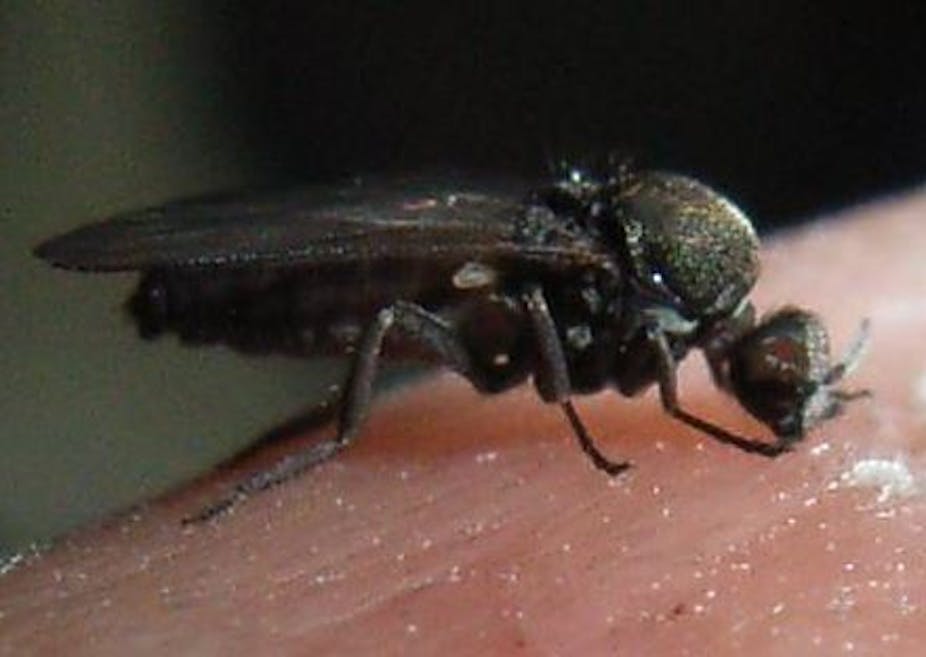Mosquitoes, biting midges, bedbugs, ticks and fleas will make a meal of us given the opportunity. And it isn’t the pain or annoyance of the bite but our bodies’ reactions that often cause greater problems.
Biting insects are different to stinging insects. The former primarily cause allergic reactions due to the saliva they inject when feeding, while stinging insects (such as ants, bees and wasps) inject venom when they bite.
Insect venom causes pain and swelling at the site of the sting and may cause anaphylaxis. Reactions can be quite severe and include urticaria, nausea, vomiting, hypo-tension, respiratory problems and, in very rare cases, death.
The reddish, inflamed and swollen reactions to bites result from an injection of insect saliva. This is a chemical cocktail of substances designed to make blood flow quickly and painlessly to the bug as it tries to get its fill and avoid being squished.

As is the case with any environmental, food or chemical allergen, everyone has a different allergic response to insect saliva. That makes it pretty much impossible to identify the culprit from skin reaction alone. But it probably doesn’t really matter too much because treatment isn’t bug-specific.
Scratch management
A recent paper in Drug and Therapeutics Bulletin looks into how we commonly manage insect bites. It highlighted the scarcity of quantitative scientific studies into the various treatments for insect bite reactions.
The authors found that the few published papers reported little evidence that currently recommended over-the-counter remedies in the United Kingdom for simple insect bites actually work. But they acknowledge that such medications may offer some relief for the discomfort associated with insect bites.
A recent Australian study also found insect bites were commonly managed with similar over-the-counter medications.
But does it work?
First and foremost, it’s important to avoid insect bites. Notwithstanding nuisance biting, the transmission of disease-causing pathogens associated with insect bites is a major cause for concern in some areas of Australia.
There’s a range of strategies that can be used indoors and outside to beat biting insects. They include using insecticides, topical insect repellents and physical barriers such as fly screens and bed nets. But what happens if a pesky insect slips past our defences?

A mild reaction to an insect bite will probably resolve itself within a day or two without any need for treatment. And if there’s discomfort caused by swelling or itchiness, a cold compress can often provide sufficient relief. But, in some cases, the use of a topical steroid may assist in reducing inflammation and an antipruritic may relieve itchiness.
Oral analgesics or antihistamines may provide relief for serious reactions but it’s probably best to discuss the most suitable products with your doctor or pharmacist. Antibiotics are rarely required for insect bites alone – generally only if a secondary infection occurs.
Bite-ridden children
Reactions to insect bites can often be worse in young children. Their little bodies haven’t had a chance to build up immunity so they’re more likely to react more noticeably than older children and adults. This adds an extra level of anxiety in their carers.
But the worst result of most insect bites is largely self-inflicted from scratching. Intense itchiness leading to incessant scratching will likely result in broken skin and secondary bacterial infection. This can become difficult to deal with but despite many reactions among children appearing quite dramatic, serious outcomes from insects bites are relatively rare.

The most important thing is to ensure that the bite site is kept clean and dry, and scratching is kept to a minimum. As soon as the skin is broken, there’s a chance of secondary infection that may result in a more significant reaction requiring antibiotics.
Most children’s reactions to insect bites will naturally become less dramatic as they get older.
Home remedies
There’s a whole host of home remedies purported as effective treatment for insect bites. These range from essential oils to mixtures of bicarbonate soda, but there’s no scientific evidence that they’ll provide relief. Most importantly, many home-made concoctions run the risk of causing a skin reaction themselves.
With insect bite skin reactions varying so greatly between people, it’ll always be difficult to have a “one-size-fit-all” approach to their treatment. Some medications may provide relief from severe allergic reaction. but for the majority of cases, that annoying, itchy little bite will just have to resolve on its own.

